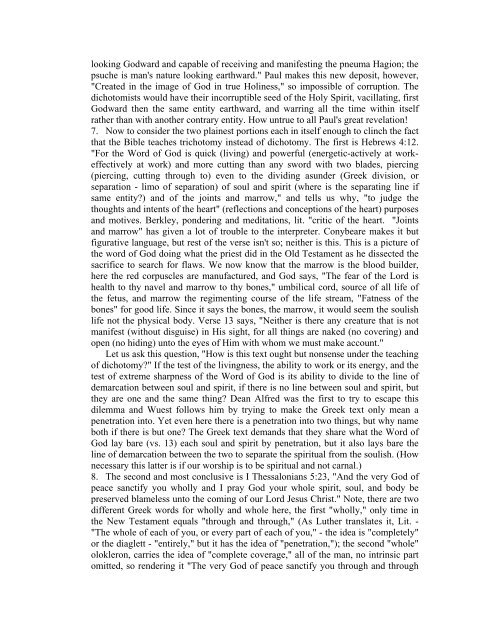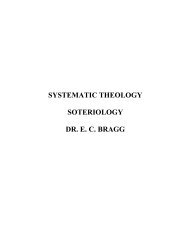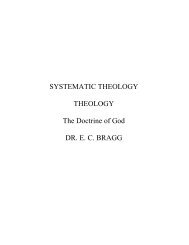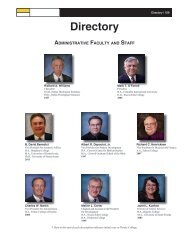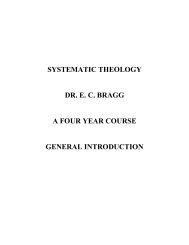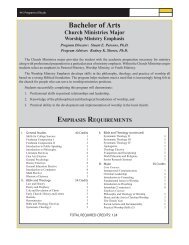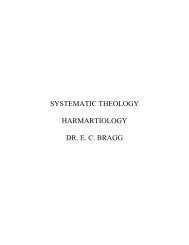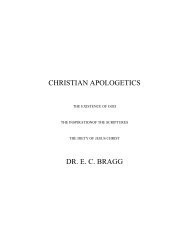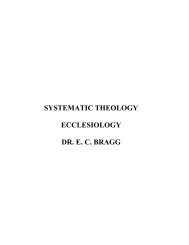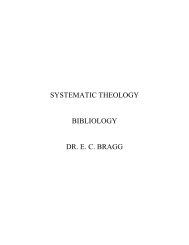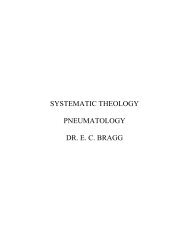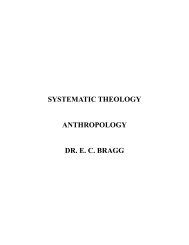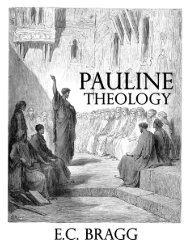CHRISTIAN PSYCHOLOGY DR. E. C. BRAGG - Trinity College
CHRISTIAN PSYCHOLOGY DR. E. C. BRAGG - Trinity College
CHRISTIAN PSYCHOLOGY DR. E. C. BRAGG - Trinity College
You also want an ePaper? Increase the reach of your titles
YUMPU automatically turns print PDFs into web optimized ePapers that Google loves.
looking Godward and capable of receiving and manifesting the pneuma Hagion; the<br />
psuche is man's nature looking earthward." Paul makes this new deposit, however,<br />
"Created in the image of God in true Holiness," so impossible of corruption. The<br />
dichotomists would have their incorruptible seed of the Holy Spirit, vacillating, first<br />
Godward then the same entity earthward, and warring all the time within itself<br />
rather than with another contrary entity. How untrue to all Paul's great revelation!<br />
7. Now to consider the two plainest portions each in itself enough to clinch the fact<br />
that the Bible teaches trichotomy instead of dichotomy. The first is Hebrews 4:12.<br />
"For the Word of God is quick (living) and powerful (energetic-actively at workeffectively<br />
at work) and more cutting than any sword with two blades, piercing<br />
(piercing, cutting through to) even to the dividing asunder (Greek division, or<br />
separation - limo of separation) of soul and spirit (where is the separating line if<br />
same entity?) and of the joints and marrow," and tells us why, "to judge the<br />
thoughts and intents of the heart" (reflections and conceptions of the heart) purposes<br />
and motives. Berkley, pondering and meditations, lit. "critic of the heart. "Joints<br />
and marrow" has given a lot of trouble to the interpreter. Conybeare makes it but<br />
figurative language, but rest of the verse isn't so; neither is this. This is a picture of<br />
the word of God doing what the priest did in the Old Testament as he dissected the<br />
sacrifice to search for flaws. We now know that the marrow is the blood builder,<br />
here the red corpuscles are manufactured, and God says, "The fear of the Lord is<br />
health to thy navel and marrow to thy bones," umbilical cord, source of all life of<br />
the fetus, and marrow the regimenting course of the life stream, "Fatness of the<br />
bones" for good life. Since it says the bones, the marrow, it would seem the soulish<br />
life not the physical body. Verse 13 says, "Neither is there any creature that is not<br />
manifest (without disguise) in His sight, for all things are naked (no covering) and<br />
open (no hiding) unto the eyes of Him with whom we must make account."<br />
Let us ask this question, "How is this text ought but nonsense under the teaching<br />
of dichotomy?" If the test of the livingness, the ability to work or its energy, and the<br />
test of extreme sharpness of the Word of God is its ability to divide to the line of<br />
demarcation between soul and spirit, if there is no line between soul and spirit, but<br />
they are one and the same thing? Dean Alfred was the first to try to escape this<br />
dilemma and Wuest follows him by trying to make the Greek text only mean a<br />
penetration into. Yet even here there is a penetration into two things, but why name<br />
both if there is but one? The Greek text demands that they share what the Word of<br />
God lay bare (vs. 13) each soul and spirit by penetration, but it also lays bare the<br />
line of demarcation between the two to separate the spiritual from the soulish. (How<br />
necessary this latter is if our worship is to be spiritual and not carnal.)<br />
8. The second and most conclusive is I Thessalonians 5:23, "And the very God of<br />
peace sanctify you wholly and I pray God your whole spirit, soul, and body be<br />
preserved blameless unto the coming of our Lord Jesus Christ." Note, there are two<br />
different Greek words for wholly and whole here, the first "wholly," only time in<br />
the New Testament equals "through and through," (As Luther translates it, Lit. -<br />
"The whole of each of you, or every part of each of you," - the idea is "completely"<br />
or the diaglett - "entirely," but it has the idea of "penetration,"); the second "whole"<br />
olokleron, carries the idea of "complete coverage," all of the man, no intrinsic part<br />
omitted, so rendering it "The very God of peace sanctify you through and through


